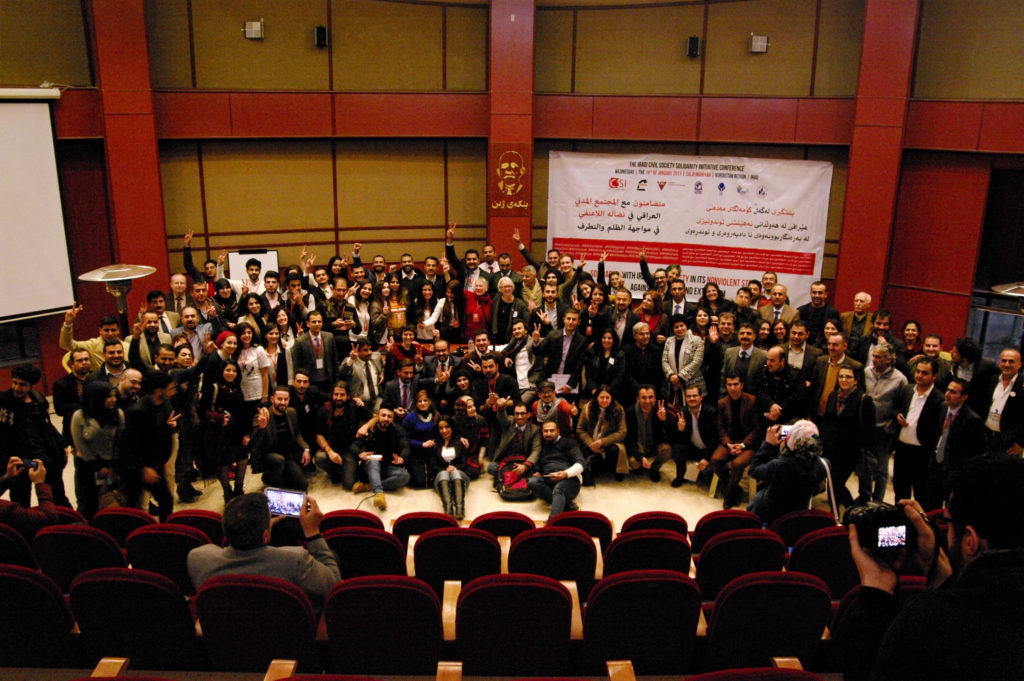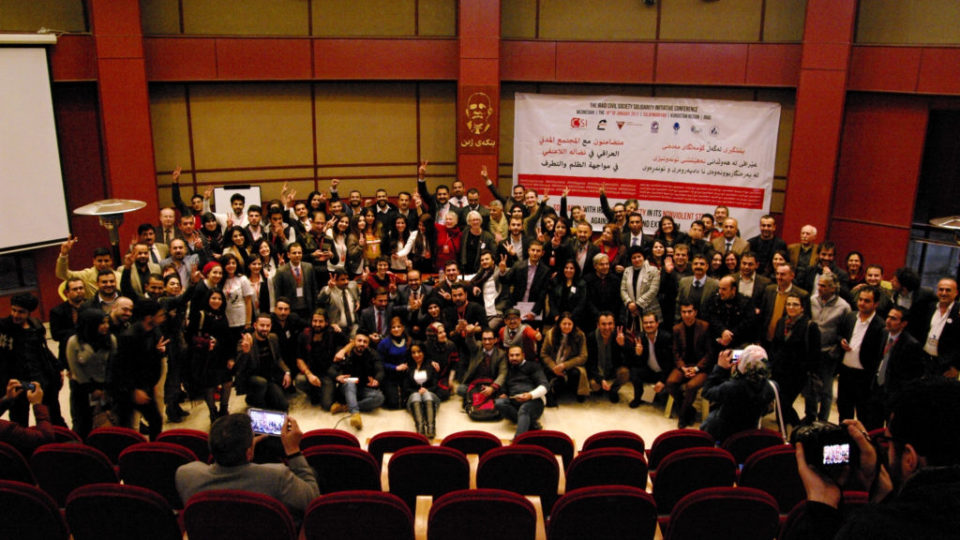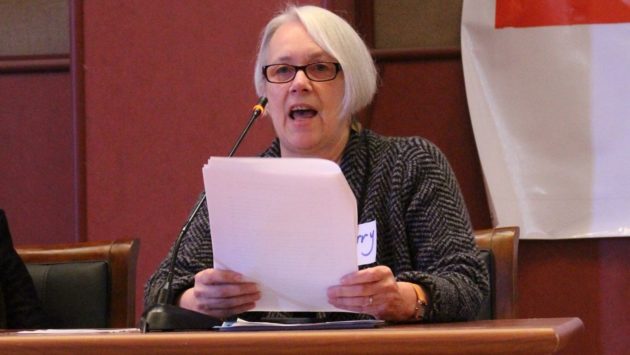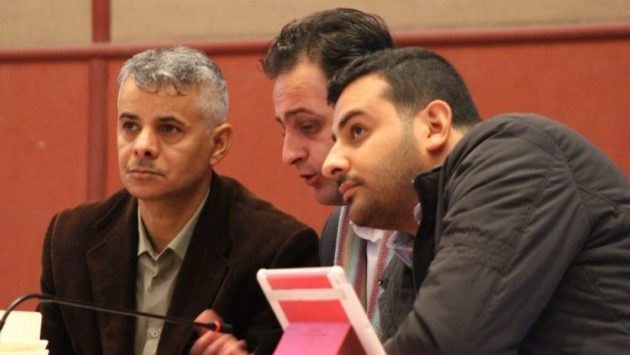The Final Deceleration of the Iraqi Civil Society Solidarity Initiative Conference 2017 in Sulaimaniyah
The Sixth Conference of the Iraqi Civil Society Solidarity Initiative
Sulaymaniyah – Iraqi Kurdistan Region
18 January, 2017

Solidarity with Iraqi Civil Society in Its Nonviolent Struggle Against Injustice and Extremism
Activists of the Iraqi Civil Society Solidarity Initiative [ICSSI], the Iraqi Social Forum [ISF], and the Kurdistan Social Forum [KSF], celebrated the big and successful and inspiring conclusion of the sixth ICSSI conference, which focused on the topic of solidarity with civil society activists in Iraq in their struggle against injustice and extremism.
Three hundred women and men activists from different parts of Iraq and International activists, with a significant presence of civil society activists from Kurdistan, attended the conference. Attendees represented a wide spectrum of civil society actors: non-governmental organizations, labor unions, popular protest movements, social justice movements, IDPs’ communities, and activists on a variety of social issues. Many of them had received threats or been attacked for their activities; they asked Iraqi institutions and the international community to work for the protection of all Iraqi Human Rights Defenders.

Conference participants discussed sensitive and complex topics, including: on-going non-violent struggle and protests, and the right of protesters to speak out against corruption through nonviolent means, especially in the protest movements in the city of Sulaymaniyah and Tahrir Square in Baghdad. Many people commented on the connections between the struggle to end corruption and sectarianism on the one hand, and how this struggle must be won in order to end religious and ethnic extremism on the other hand. Another major set of concerns was the return of IDPs; participants discussed the reconstruction of liberated cities, reconciliation and peace-building after DAESH, the rebuilding of the civil state and confronting sectarianism and division. In addition, there was great interest in the economic and social rights of Iraqis, including the right of trade unionists to organize; the protection of human rights defenders; freedom of expression and the press; women’s participation in all aspects of civil society, women’s political participation, and gender equality; water and environmental rights; and youth activism for sports and arts against violence. Each of these topics was the focus of a working group at the conference, which discussed and came up with recommendations that are included at the end this statement.
Forty women and men volunteered to organize the ICSSI conference. They worked extremely hard to meet all the needs of the conference, including the registration process, organizing the conference hall, tea breaks and the lunch break, conference publications, and translation. The Global Youth Organization [GYO] managed the volunteers and organized their efforts.
The ICSSI chose Sulaymaniyah city, the Jewel of the Iraqi Kurdistan Region, as the place for its sixth conference, since the city has hosted the ongoing waves of nonviolent protests against the corruption that has deprived citizens of their basic needs. At the opening, conference participants were welcomed by Shanya Saeed from the GYO and Peshkawt Adham from Almesala organization. They called for a minute of silence in honor of those who have lost their lives in the struggles to reform the governments in the KRG and Iraq. The opening speech of the conference entitled “Lessons from Sulaimaniya on International Solidarity” was presented by Ismaeel Dawood on behalf of the ICSSI Secretariat. Dawood began his speech with a moving greeting to the city of Sulaimaniyah, recognizing its history associated with struggle, sacrifice and solidarity. He spoke of the city’s poet and activist, Sherko Bekas, who stood in solidarity with the Palestinian cause and mourned the poet Mahmud Darwish by recalling his struggle. Dawood also expressed his greetings to the people of the city who hosted with open hearts the tens of thousands of IDPs from different religions and nationalities: the “Iraqi and Syrian Rainbow”.

And from the protests arenas of Sulaymaniyah, the activist Awat Hasan Abdullah offered a resounding intervention that located the city of Sulaymaniyah in the heart of nonviolent struggle for social justice in Iraqi and the region. The protests point out stark contrasts: employees in the city have been living without salaries or any source of livelihood for months, while the administrative and financial corruption condoned and carried out under the rule of political parties in the Kurdistan Region threatens life in the region. These party officials spend money for their personal benefit, and to benefit their associates in bureaucratic ways to ensure their loyalty to political parties. These parties monopolize power and wealth without caring for the suffering of the poor and needy. This has made Sulaymaniyah a headquarters for peaceful protests for months.
Next, Ali Sahib, Secretary of the ISF, presented a speech, authored by Jassim Al-Hilf, a leader of the protests in Tahrir Square in Baghdad, which described the goals of Baghdad’s nonviolent demonstrations. The protesters are opposing corruption, sectarian quotas, and extremism; they hope to establish a civil and democratic state in Iraq, one based on equal citizenship for all, with public policies that promote job opportunities and provide all necessary services without discrimination. Sahib also talked about supporting solidarity between the protests in Sulaymaniya and Baghdad since they share the same methods and goals.
Terry Rockefeller, one of the founders of September 11th Families for Peaceful tomorrows, talked about the resurgence of nonviolent struggles that the US is experiencing in response to the policies and rhetoric of its new president, “Donald Trump”. She called eloquently for all the conference participants to remember that “We Are All Part of a Global Struggle”.
Martina Pignatti from Italy, denounced how the international community focuses only on a military response to Daesh, which neither creates a sustainable peace, nor spends resources in ways that benefit the communities that have been devastated by terrorism. She asked why so little is being invested in peacebuilding, which means that all the underlying conflicts among communities that existed when Daesh arrived continue to exist. Internationals need to support nonviolent alternatives to counter extremism and injustice.
All of these interventions opened the door for attendees to join in discussion. There were many questions about the solutions that are needed to address the complex and interrelated problems that Iraq and the Kurdish Region are experiencing. This paved the way for two sessions after lunch, which included working groups on the following topics: rebuilding the civil state and facing sectarianism and division, social and economic rights and trade unions, protection of human rights defenders, freedom of expression and the press, women’s political participation and gender equality. An additional working group was added at the request of the peace building team, CPT, who expressed the need to discuss the repeated attacks by Turkey on the border villages within the boundaries of the Iraqi Kurdistan Region. Recommendations of the working groups can be found below.
The conference agenda established the basic principles of the conference, agreed upon by the Iraqi and International organizers; these principles were respected by all. There was no discrimination on an ethnic, religious or gender basis; and the conference was based on participation and discussion that was independent of the government or any political party or religious group or category. The conference supported nonviolent struggle as the only means to seek change, and the voluntarily work, ethics, non-profit struggle of civil society. The Sixth Conference of the Iraqi Civil Society Solidarity Initiative 2017 in Sulaimaniyah was supported by: Fondation Assistance Internationale (Switzerland), Karibu Foundation (Norway), and the Organization CCFD-Terre Solidaire (France).

Conference Recommendations:
We call upon the Iraqi Government, the Kurdistan Regional Government, the United Nations Mission in Iraq (UNAMI), the European Union and the entire international community to take responsibility for ensuring the protection of human rights and personal freedoms in Iraq, by acknowledging the voices of the nonviolent protesters and supporting the conference recommendations. These recommendations were the product of extensive discussions between Iraqi and international activists during the conference. We identified nine core challenges for Iraq and set forth recommendations for each challenge individually.
We strongly request the international community promote and support these recommendations as the basis for any political or economic dialogue, or military cooperation with the Kurdistan Regional Government and the Central Government.
Failing to respect these recommendations could result in complicity by the international community in the repression of human rights defenders, as well as the rise of extremism and violence in Iraq. Iraqis have experienced more than 30 years of conflict; they demand immediate change and require solidarity from the international community.
Reconciliation and Peacebuilding for the Return of All IDPs
- Work on ensuring security and building trust between the security services and the community, by respecting the rights of civilians without any discrimination and through commitment to the application of international humanitarian law and human rights law, and limiting possession of arms only to the government.
- Provide all basic and necessary services in all areas, especially those newly liberated and those hosting IDPs and refugees.
- Provide compensation to civilians affected by the hostilities or “DAESH” crimes (amending Law n.20), to make them more able to rebuild their homes and places of work and return to normal life.
- The application of transitional justice relying on voluntary cooperation and openness of societies that were occupied by “DAESH”, through the formation of community reconciliation committees at the level of each local municipality.
- Adopt a policy of on-going dialogue within local communities to address all social and political problems and the issues of IDPs’ return, building sustainable peace, and promoting social cohesion among all.
- Enhance the concept of participation and citizenship among all the people, without discrimination on national, ethnic, religious or sectarian basis.
- Ensure the conduct of free and fair elections by amending the electoral law, so that it is not based on the monopolization of power and that allows small lists to participate in the parliament and in provincial councils.
- Support sustainable development programs in the liberated and hosting areas for the IDPs and those affected by the cycles of violence experienced by Iraq during the last three years.
- Guarantee freedom of opinion and belief for all, without distinction between religious or non-religious, and between religion or another and sect or another.
Gender Equality and Women’s Political Participation
- Adopt equal representation of women in all the laws regulating the work of national independent bodies such as the Media Commission, Election Commission, Human Rights Commission and others, and in the similar institutions of Kurdistan region.
- Adoption equal representation of women in the Iraqi government and all executive institutions.
- Implement the ratios of women’s representation in the independent bodies and in the executive branch, that ensure electing independent and efficient women, and not accepting to repeat the standard sectarian and ethnic quotas in the nomination.
- Amend the constitution to abolish Article 41 that threatens women by imposing reactionary and sectarian legislation.
- Implement Civil State law, and study adjusting it to be in line with international standards with the support of relevant international institutions; abolish Article 26 (Islamization of minors).
- Start immediately to apply the National Action Plan for UN Security Council Resolution 1325.
- Ensure the participation of displaced women in the relevant institutions that organize and manage the IDPs camps and in all voluntary return and reconstruction programs.
- Ensure the participation of women in all committees of reconciliation and peace and social coexistence, at all levels.
- Open doors for international solidarity to provide psychological and social support to women who have been raped or subjected to violence under the occupation of “DAESH” of their cities, especially psychological and social support.
Trade Unions and Social Economic Rights
Demands addressed to the Iraqi parliament and the parliament of the Kurdistan Region:
- he importance of laying the foundation for a genuine and effective social dialogue between the government, workers and their organizations, employers and their organizations to ensure the economic and social rights of all, whether through legislation or other means.
- Issuance of a new labor law, social security and trade union action in the Kurdistan Region to be compatible with international labor standards.
- Emphasis on full enforcement of the new Iraqi labor law and the issue of instructions attached to it as soon as possible, and the involvement of workers and their organizations in all issues related to this.
- Expedite the issuance of the rights and freedoms of trade union law in Iraq and the involvement of workers and their unions in all the details of this legislation, which must comply with international labor standards.
- The importance of the ratification of the ILO Convention No. 87 of 1948 relating to the rights and freedoms of the trade unions.
- Ensure the independence of trade union action at all levels through new trade union legislation that ensures this independence.
- The importance of involving workers and trade unions in all the details of the legislation of the new social security law in Iraq and listening to their opinions and taking it into consideration the fact that the law regards the lives and the future of workers and their families.
- Importance of adopting effective policies for unions to increase the participation of women and youth in trade union work, at all levels and in particular in leadership positions.
- Importance of coordination and joint work between trade unions and civil society organizations specializing in economic and social issues.
- Importance of an awareness campaign on economic and social rights of workers and of national laws on this issue.
- Importance of continued solidarity and joint action between workers and trade unions in Iraq and the Kurdistan Region on all relevant issues, taking advantage of successful previous experience.
- Emphasize the importance of international solidarity with workers and trade unions in Iraq and Kurdistan region on economic and social issues and to be given the utmost importance.
Sports and Arts against Violence
- Learning from previous experiences where we used sports and arts to combat violence in Iraq, we need to repeat these experiments in more cities in order to promote harmony and social cohesion in our communities.
- Expansion of youth activism for the use of sports and art tools to challenge violence in additional Iraqi provinces and the creation of work groups of volunteers in every city in order to promote this concept.
- Unite efforts and create a communication network between these groups to exchange experiences and ideas in the creation of activities in these different cities.
- Build the understanding and capacities of volunteers in these groups concerning the concepts and principles of nonviolent action.
- Spread a culture of non-violence within communities by collaborating with writers and artists.
Water and Environmental Rights
- Organize to oppose the Darian dam through enhancing cooperation between the groups in the areas of Halabja and Diyala.
- Follow-up on UNESCO’s recommendations to protect the natural and cultural heritage of the Iraqi marshes.
- Focus on educating young people in order to raise their awareness about water resources in Iraq, by paying visits to schools and religious institutions.
- Strengthen cooperation between the Iraqi civil society and Kurdish civil society on water and environmental issues.
- Identify further common issues that have an impact on the Iraqi Kurdistan region, and the southern areas of Iraq in order to intensify national campaigns that incorporate both Southern Iraq and the Kurdistan Region.
Freedom of Speech and the Press
- Allow no legislation that contradicts international standards of freedom of expression, including the freedom to express opinions, to peacefully demonstrate and protest, and the right to access information. End discussion of all draft laws that violate these human rights standards, including the draft “Cyber Crimes Law”, the draft “Freedom of Expression and to Demonstrate Law” and others, until there is dialogue with the all concerned members of civil society and with international experts and specialists for the purpose of making substantial amendments to the clauses contrary to international standards.
- Combat impunity and take responsibility for disclosing the culprits and perpetrators of killings or kidnappings of journalists and bring them to justice in fair trials.
- Clarify the fate of human rights defenders Jalal Al-shahmani and Waei Al-Mansouri and conduct prompt and transparent investigations about their treatment.
- Ask the Kurdistan Regional Government for the application of the law of freedom of access to information quickly and in a positive spirit, to further human rights goals.
- Protect journalists who expose and report on corruption and organized crime from repression by political parties.
- Support female journalists who bring anti-harassment cases following assaults by officials or heads of media organizations, or harassment in the workplace.
- Respect the freedom to establish trade unions and undertake trade union action, and oppose interference in independent trade unions by the government or its ruling parties.
Effective Nonviolent Resistance and Social Struggle and Protest
- The need to study and discuss methods of nonviolent struggle and social protest.
- The need to coordinate protest for the sake of the common struggle.
- Protection from harassment of women during protests and demonstrations.
- The need to educate the community about the concepts of nonviolent protest through the media.
- The importance of facing the phenomenon of uncontrolled weapons and launching efforts to control them.
- Training activists about the strategies and techniques of nonviolence.
- Uniting the protest movement under effective and influential slogans.
- The need for independent public voices distinct from political parties.
- Working with local authorities and religious leaders.
- National solidarity about the painful events that the country is going through.
- Including the concepts of nonviolence in school curricula.
- Educating young people about the need to avoid violent provocations of the police and security forces and riots.
Rebuilding Society and Towns after “DAESH” with People’s Participation
- Obstruct policies to expel collaborators with DAESH from their towns, through the development of dialogue with these people, introducing them to information on the destruction caused by Daesh, and differentiating between those convinced of Daesh’s ideology and others.
- Transitional justice and compensation, including a mechanism for the restitution for confiscated land and property, to prevent and stop acts of revenge.
- Development of educational curricula that include concepts of nonviolence and promoting peace education at all levels.
- Psychological and social support for the victims and the rehabilitation and integration of abducted women, to help their communities overcome prejudice.
- Open dialogue within communities liberated from Daesh by sending civil society delegations from other regions of Iraq, like the Iraqi Social Forum and Kurdistan Social Forum are doing.
- The need to limit abuses by the authorities, through the training of security forces to respect human rights. Additionally, the need to prevent politicians from using DAESH in order to maintain their power and continue corruption. This is key, since many fighters joined DAESH only to oppose bad conduct of government institutions.
- Provide job opportunities for young people and promoting economic development.
- Develop targeted messages to involve key people and categories: tribal sheiks, imams, women and the media.
Repeated Bombings on Villages within the Borders of Iraq by Turkey
- Educate the European Union and the international community about the attacks inside Iraqi borders and involve them in demanding that the Turkish government to stop the bombings.
- Educate Kurdish activists and associations about organized nonviolent action to resist these attacks and provide protection for them.
- Communicate with the media to encourage reporting on activists who are working to end the bombings and reporting on the effects of the bombing.
- Talk with members of the KRG government and explain the importance of finding lasting solutions to problems of the border.




